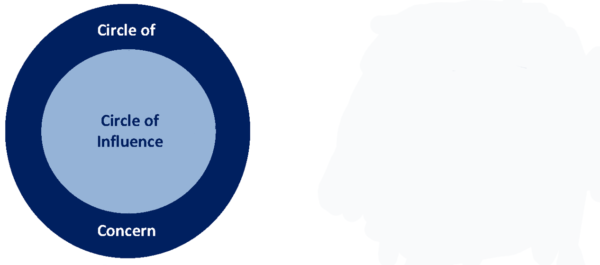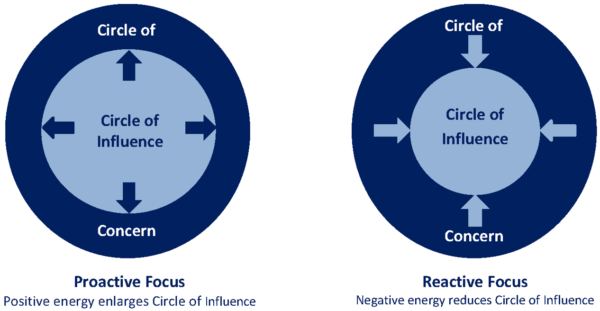
Why you need to let go of things you cannot control
In case you haven’t heard the buzz, one of the most common traits displayed by individuals selected for promotions is emotional intelligence (EI). Wikipedia defines EI as: “the capacity to be aware of, control, and express one’s emotions, and to handle interpersonal relationships judiciously and empathetically.”
I’d bet the people at work you admire are unlikely to fly off the handle when something goes wrong. It’s not that they aren’t upset; it’s that they choose not to waste time and energy on acting upset. In high pressure situations they stay respectful of the people around them, look for a solution if they think one is possible, and then move on if they judge the issue out of their control. They have emotional intelligence.
Stephen Covey outlined why this type of person generally gets ahead over reactive (low EI) people.
He told us that we all have a circle of concern that includes the things we care about such as our health, our children, problems at work, our love life, wars, national debt, etc. Let’s call this circle of things we care about our circle of concern.
It’s immediately obvious that within this circle there are both things we can control and things we can’t. If we draw a smaller circle inside the circle of concern and put those things we can control into it, we could call this smaller circle the circle of influence.

Quoting Covey from the Seven Habits of Highly Effective People:
Proactive people focus their efforts in the Circle of Influence. They work on the things that they can do something about. The nature of their energy is positive, enlarging and magnifying, causing their Circle of Influence to increase.
Reactive people, on the other hand, focus their efforts in the problems of the environment, and circumstances over which they have no control. Their focus results in blaming and accusing attitudes, reactive language, and increased feelings of victimization. The negative energy generated by that focus, combined with the neglect in areas they could do something about, causes their Circle of Influence to shrink.
Nobody likes to listen to people who are negative, complain and go on about things that will not change. They become a broken record since the issues they choose to focus on will not be likely to change. We all have a friend like this.
On the flip side are the people who focus on the bright side, not just to be cheery, but because they know the bright side is where you find solutions and inspiration. These people know that when you get focused on solutions you increase your capacity for success though “how to” learning and from the good feelings of having accomplished something. For this type of person, an individual focused on what they can do instead of what they can’t, the circle of influence grows bigger over time.
Much like their career prospects.
